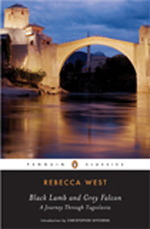and Balkan Europe
by IECOB & AIS Università di Bologna

Black Lamb and Grey Falcon: A Journey Through Yugoslavia
by: Rebecca West
published by: Penguin Classics
pp: 1200
ISBN: 0140188479
price: $ 15.79

This book is a travelogue as well as an historical account. In her travels, West became an admirer of the Serbs and their culture, often contrasting it favorably with the West. She repeatedly refers to the devastation that followed the battle of Kosovo in 1389, in which the Serbs were defeated by the Turks, and which led to five hundred years of Turkish rule. In the epilogue (written in 1941, two years after the outbreak of World War II) she praised Yugoslavia for refusing to capitulate to Nazi Germany.
In addition to being a travelogue and a history, Black Lamb and Grey Falcon is a forum for West’s forcefully argued views on a variety of topics, ranging from relations between men and women, to art and music, to the nature of empires and questions of metaphysics. The book also illustrates the relationship between West and her husband and contains a lively cast of traveling companions, including Constantine (the Jewish Serb poet) and Gerda (his nationalistic German wife).
Table of contents
Prologue
Journey
Croatia
Dalmatia
Expedition
Herzegovina
Bosnia
Serbia
Macedonia
Old Serbia
Montenegro
Epilogue
Chapter-by-chapter
(Chapters 1 to 4)
Prologue
In the prologue to Black Lamb and Grey Falcon, West explains how she came to be interested in Yugoslavia. She recalls her distress when she heard in 1934 that King Alexander of Yugoslavia had been assassinated in Marseille. At that point, West knew nothing of Yugoslavia, other than the fact that the Balkans was a violent place. But given the fact that events in the Balkans led to World War I, in which West as a British citizen had been endangered, her ignorance of the region meant that she knew nothing about her own destiny. In 1936 she was invited to lecture in Yugoslavia, and the following year she visited the country again.
Journey
West and her husband travel by train from Salzburg, Austria, to Zagreb, the capital of Croatia. Traveling in a first-class carriage, they meet some disagreeable Germans, who force a young man to vacate his seat because he only has a second-class ticket. It later transpires that the Germans have second-class tickets too.
Croatia
In Zagreb they meet three friends: Constantine, a Serb poet; Valetta, a Croat mathematician; and Marko Gregorievitch, a Croat critic and journalist. The three men dislike each other and they argue constantly. West and her husband see the sights of Zagreb, and engage in intellectual conversations in the cafes. They visit the village of Shestine and two castles in the country during Easter. Then, they return to Zagreb and visit the cathedral. West interweaves the travelogue with the turbulent story of Croatian history. Oppressed by the Austro-Hungarian empire, Croats had rarely known peace and security, and West regards the Austrian influence to have had very bad effects. She also reports on the fragile state of Croatian politics. Valetta fights for free speech and a free press, but the undemocratic forces are in control of the government.
Dalmatia
West and her husband travel south by train to Dalmatia on the Adriatic coast. West observes that Dalmatia has changed hands many times over hundreds of years and has known little stability. They visit the isle of Rab, and West declares it to be one of the most beautiful places in the world. She admires the people of Dalmatia because they resisted the Ottoman Empire and so ‘‘saved’’ the West from Islam. In Split, she admires the Roman architecture and discusses the Roman emperor Diocletian. West and her husband then visit Trogir, Korchula, and Dubrovnik. In spite of its beauty, West does not like Dubrovnik.
Download
PECOB: Portal on Central Eastern and Balkan Europe - University of Bologna - 1, S. Giovanni Bosco - Faenza - Italy
Chiudi la versione stampabile della pagina e ritorna al sito.